Thank you for reading UNLOST issue 24
Main Page
Sometimes I hear the earth’s sunken voice,
……a throat-slit pouring silk, saying
…………this is water; this is darkness;
this is a body fitting your description. Saying
……we can never be without loss
…………too long.
The cemetery expands its borders―little milky crosses
……grow like teeth. I knew I would lose you. Why
…………do stars break the morning sky?
I’ve engraved your name
……on the palms of my hands. We are two guests
…………on an excess, fugitive cloud.
Some say we are living
……at the end of time. An afterlife
…………of parts―rubble, but not without shape;
the sunset’s patchy rust; a creek of shadows; a body
……displaced against the pull of the waters.
…………No me, no you. No beginning, no end.
Come home, come home, the five porches weep.
……Old bone home―mottled mildewed wallpaper
…………like a wet coat we couldn’t put back on;
a naked animal in search of a pelt. Some things
……are hidden from us: the film of old water in a well;
…………glaciers in a slow dissolve.
Eight weeks of deluge and gloom, but dear eager earth
……makes its impossible offer: one thousand birds in the hand,
…………well water sweet for a hundred miles, and light,
more new light. How kind time is. Messages from the dead
……arrive like calm white birds with a gift, and all
…………the sky there is fills my throat.
Cento, drawing from poems by Malachi Black (“Sifting in the Afternoon”); Robert Bly (“Living at the End of Time”); Rachael Boast (“Disfigurations”); Mahmoud Darwish (“To a Young Poet”); Dan Gerber (“Often I Imagine the Earth”); Robin Gow (“Sacrament 1); Chloe Honum (“Spring”); Luther Hughes (“Stay Safe”); Susan Kelly-Dewitt (“Reading St. John of the Cross”); John Koethe (“Murray Gell-Mann”); Joy Ladin (“Forgetting”); Sylvia Legris (“Gazetteer of the Back Yard”);John McCauliffe (“The Ax”); Spencer Reese “(At Thomas Merton’s Grave” and “ICU”); James Schuyler (“Scarlatti,” “Sweet Romanian Tongue”); Eleanor Wilner (“Encounters in a Local Pub”)
Barbara Sabol‘s second full-length book, Imagine a Town, was awarded the 2019 Sheila-Na-Gig Editions poetry manuscript prize. Her awards include an Individual Excellence Award from the Ohio Arts Council. She lives in Akron, OH with her husband and wonder dogs.
I bit back my tongue.
among strangers
my name
held the sun’s fire
I saw only white
my
ears whispered secrets
Shh! Shh!
sacrifice
and
lean away from the wind

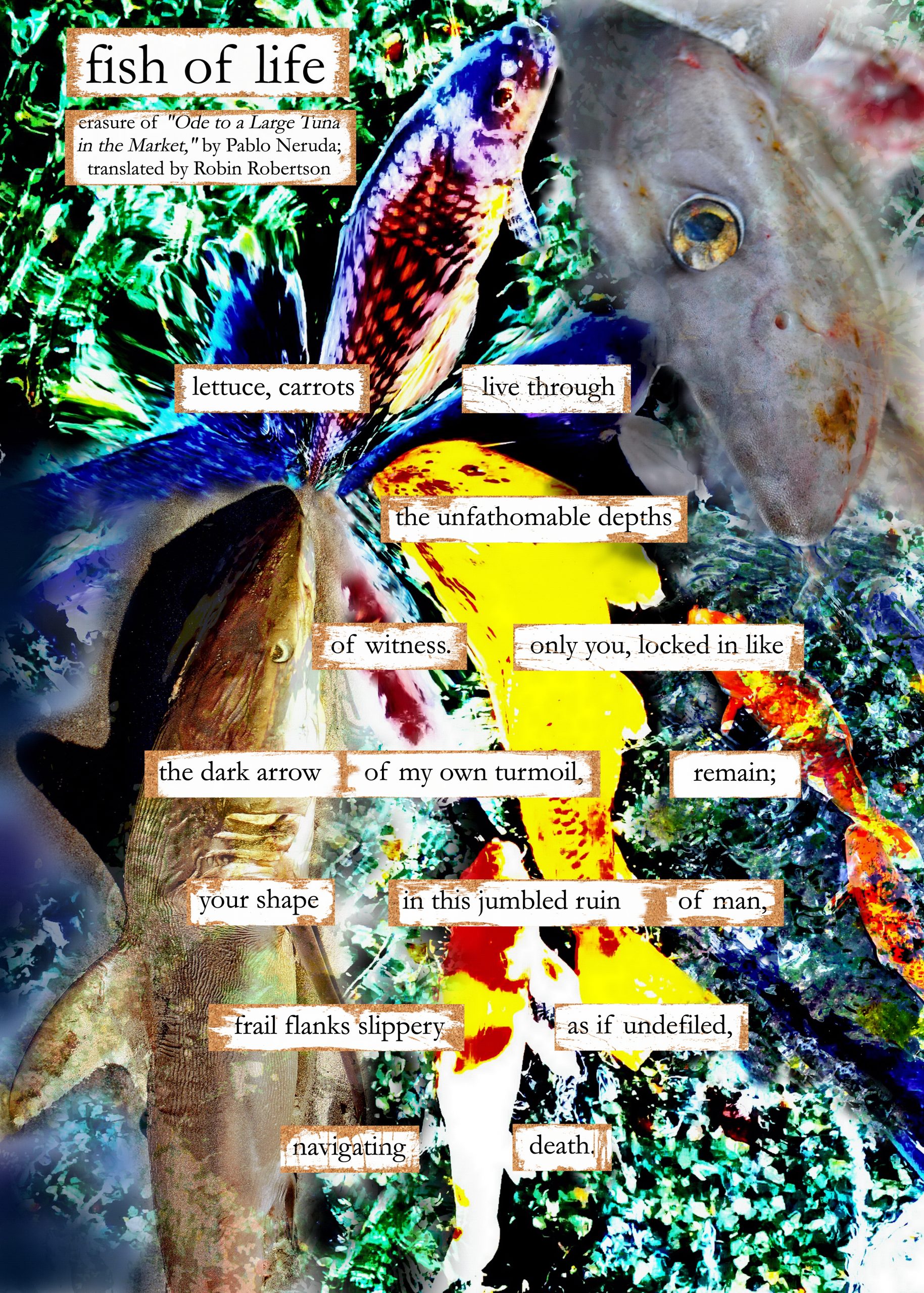
Erasure poems, with original art. Found sources of text attributed below the title of the piece. “Word” erasure docs available upon request.
Decades ago, autodidact/ bloody-minded optimist kerry rawlinson gravitated from sunny Zambian skies to solid Canadian soil. Now she stalks Literature & Art’s Muses around the Okanagan Valley, still barefoot. http://kerryrawlinson.tumblr.com
1
Down there where it can’t be seen, down there where it is neither seen nor monitored by anyone, it is following a deep, coherent, and premeditated trajectory.
The great, tender, and warm freemasonry of useless erudition.
2
We are forced to tell the truth, we are constrained, we are condemned to admit the truth or to discover it.
Power passes through the individuals it has constituted.
It is always easy, and that is precisely what I hold against it.
3
People with dust in their eyes and dust on their fingers
born in burning towns and ravaged fields.
We are all inevitably someone’s adversary.
And something fragile and superficial will be built on top of this web of bodies, accidents, and passions, this seething mass which is sometimes murky and sometimes bloody;
Cynical rage in all its nudity
4
This Mythology tells of how the victories of giants have gradually been forgotten and buried, of the twilight of gods, of how heroes were wounded or died, and of how kings fell asleep in inaccessible caves.
Those who find themselves, perhaps for a time – but probably for a long time – in darkness and silence.
There is no blood and there are no corpses.
5
A knife to our throats
The knife at our throats
A double outline or a twin
Two branches that grow from the same trunk
A circular knowledge which derived knowledge from knowledge
6
This too is hateful
Someone else begins to say “I” and “we”
This is no longer the glorious history of power; it is the history of its lower depths, its wickedness, and its betrayals.
It was not power’s ode to itself.
7
A stable dyssymmetry or a congruent inequality.
The bastard sons of the adventurers of the night
The present is no longer a moment of forgetfulness
8
Death was now something that slips in to life, perpetually gnaws at it, diminishes it and weakens it.
9
It is a new body, a multiple body, a body with so many heads that, while they might not be infinite in number, cannot necessarily be counted.
To make it proliferate, to create living matter, to build the monster.
Michel Foucault, “Society Must Be Defended”: Lectures at the College de France 1975-1976, English Translation by David Macey. Beautiful sentences arranged in order of appearance in an attempt to find a through-line.
Emmeline Solomon is an artist and educator who lives and works in Albion, Michigan. She holds an MFA from Washington University in St. Louis, a BFA in Printmaking from the Maine College of Art.
When Adam ate from the Tree of Knowledge, all the animals ate from it, too. I want to write about warm milk silent as a bee hive. Hot-buttered grits and of all the places where they might shine. I want to write about three strands of hair. About something more human than lava. The time no one laughed but me. I want to write about feeling bored and counting snowflakes stamped in silver while spelling out my new name. I could solve problems. Get the answers I want. Nothing goes down easier than when what there is to lose is everything. I want to write in a place where fireworks percuss. Loud and certain as the auctioneer’s racket. Let the conversation be bilingual. Go ahead and eat the poem. Flaunt its imperfections. Re-write the narrative on a darkening hill. We will kill or die. Or become the lion.
Bibliography:
When Adam Ate from the Tree of Knowledge, All the Animals Ate from It, Too, Nickole Brown
Bitter Vision, Wendy Vergoz
The New Twilight Zone: ‘Empty City,’ Jennifer Knox
Hot-Buttered Grits, Allyson Horton
After God, Jennifer Browne
Hands, Siv Cedering
The Lava on Iceland, Katy Didden
After Taking Me Home, Heather Sellers
Pandora Speaks, Karen Kovacik
Coming Home, Kendra DeColo
Project Challenge, Liz Kershner Whiteacre
Immersion, Patti White
How It Is, Alice Friman
Robinson Escapes to the Cape for Independence Day, Kathleen Rooney
After the Auction, I Bid You Goodbye, Aimee Nezhukumatathil
The Contract Says We’d Like the Conversation to Be Bilingual, Ada Limón
Here, Kim Addonizio
Show Off, Allison Joseph
P. S. Assault, Alessandra Lynch
Creek-Song, Shari Wagner
Become the Lion, Traci Brimhall
I composed “A Gratitude Cento” to express my gratitude to the women who had influenced me as a poet. It is based on lines I selected from twenty-one poets who had instructed me in face-to-face workshops or in virtual workshops during the current pandemic. I am truly grateful for the help each instructor gave me.
Michael Brockley is a retired school psychologist who lives in Muncie, Indiana. His poems have recently appeared in The Thieving Magpie, Last Stanza, and The Twin Bill. Poems are forthcoming in Flying Island, the Indianapolis Anthology, and the Exeter Hometown Anthology.
Tap lightly, and everywhere
beneath an awning tinkling with raindrops
Kiss the back of a slender petiole
Whisper sea-secrets into a shell
Admit what pales and what thaws
Dance until the sweat soaks your hair
Search out a new queen
Scramble them and think––
the words for that one thing without an end
Protect it, the light on the wall
Scrub the heavy storm air
Drop fears and shame
Scatter them like ashes out the window––
fibs and edits that snatch identity
Taste the motion, even as you walk too fast
Cage the lion who prowls in your mouth
Close upon the words, then a rose, then nothing
Jacquelyn “Jacsun” Shah: A.B. & M.A. English; M.F.A., PH.D. English literature, creative writing–poetry. Published: various journals/anthologies; chapbook; full-length book. Winner––Literal Latté’s Food Verse contest 2018.

An erasure of pg. 155 from Dear John by Nicholas Sparks, published by Grand Central Publishing © 2006.
April Garcia has appeared in multiple anthologies published by both the Laurel Crown Foundation of San Antonio, Texas and Southern New Hampshire University, and in Northwest Vista College’s Spring 2009 literary journal The Lantana Review.
The moon peeks between impenetrable clouds.
Steely seas, cold blue, roar against majestic crags
that tower over our rickety vessel. We do our best,
hours before dawn, to catch the lights below:
twinkling fish that promise another dream.
The blinding sun, an island on the horizon,
disappears the stars into morning. Upon
the swaying deck, children ask about something
that stirs beneath, brooding a doleful song
about unkind eyes––rapiers of silver.
A still evening, we drift past a foreboding
town: floating, deserted: a place of bad omens.
Something cries below, the boat pushes on.
Storm clouds some way off, an elder awakes
from a vision but refuses to speak of it.
The winds begin to howl; mauve hills
on the horizon. Restless, the starlit ocean
for as far as the eye can see teems with dead fish
adrift on the blue. Our future is uncertain.
The sacred, never-ending sea begins to surge.
Twitter Bot: @str_voyage // compiled and collated bot messages into a coherent narrative poem.
Matthew Schultz teaches Irish Studies and creative writing at Vassar College. He is the author of two novels––On Coventry (2015) and We, The Wanted (2021). His most recent poems appear in Thrush and Eunoia Review.
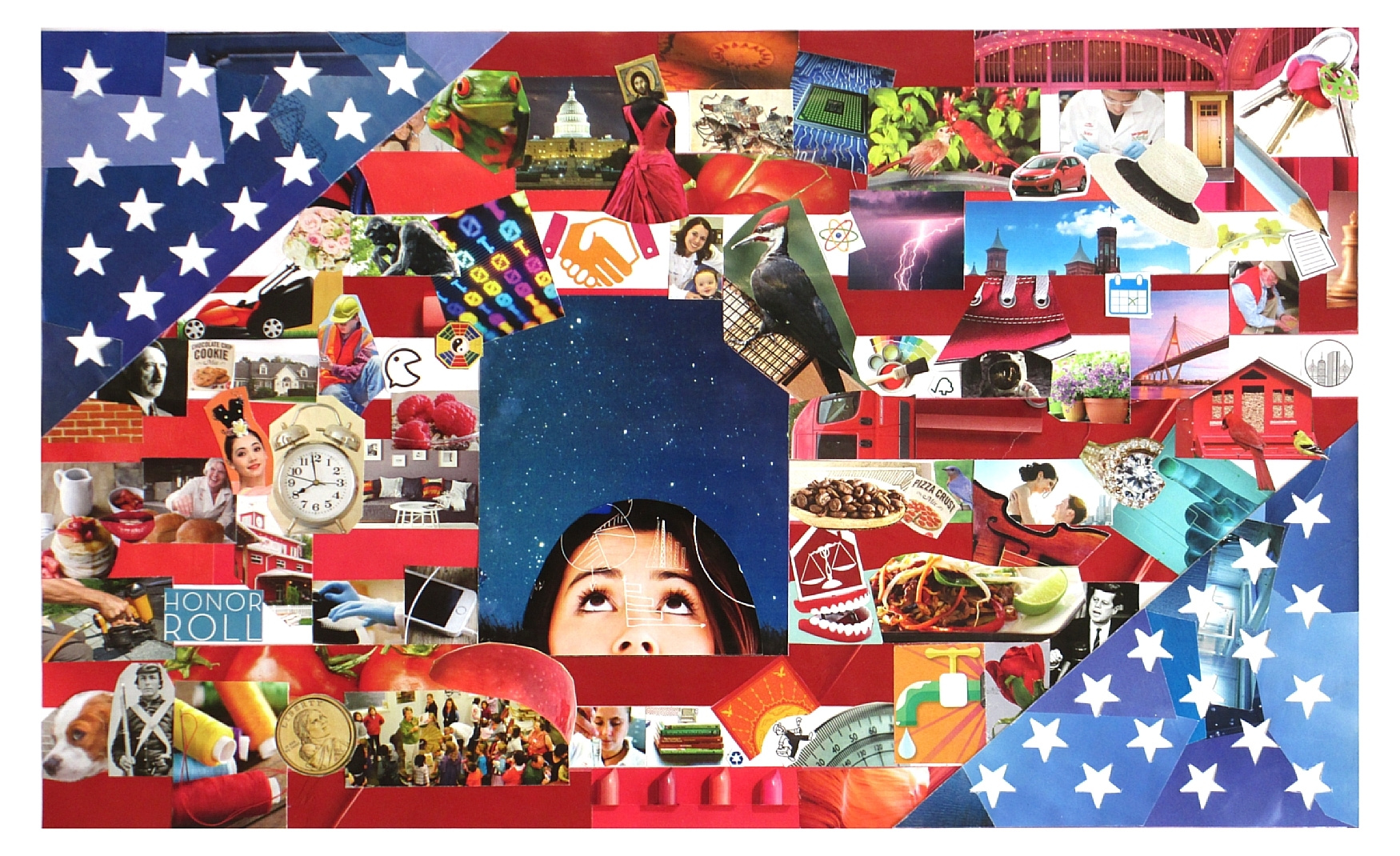
Collage from junk mail and bridal-industry magazines. The busyness of the image speaks to the way young people must navigate their hopes and identities around political schisms and a constant barrage of corporate advertising.
Despite all the bright and shiny distractions, C.B. Auder sometimes creates artwork, stories, and poetry. They edit the online journal Claw & Blossom.
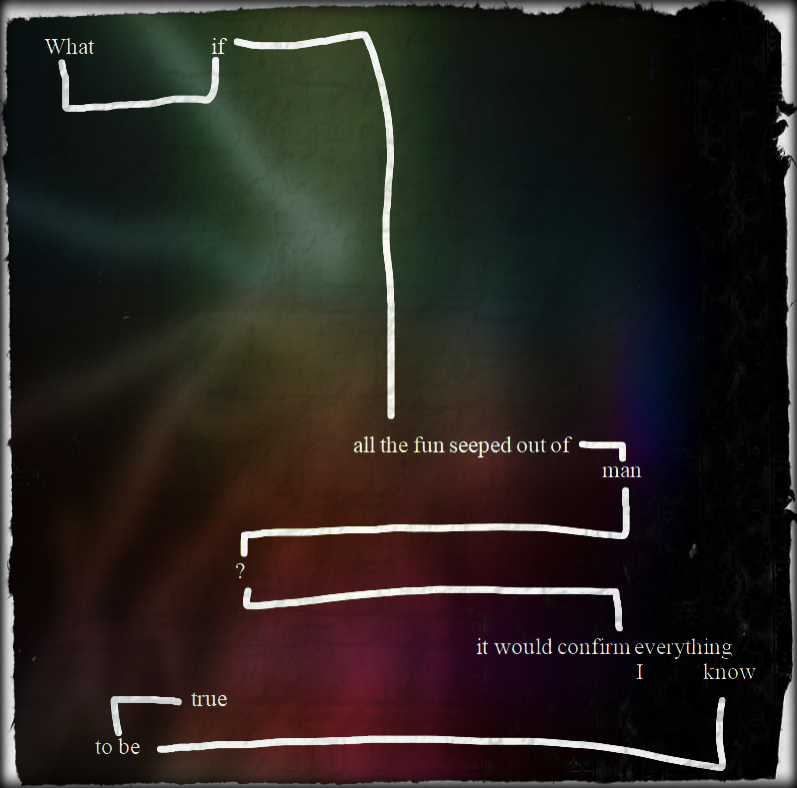
Shloka Shankar is a poet and visual artist from Bangalore, India. A Best of the Net nominee and award-winning haiku poet, Shloka is the Founding Editor of Sonic Boom and its imprint Yavanika Press.
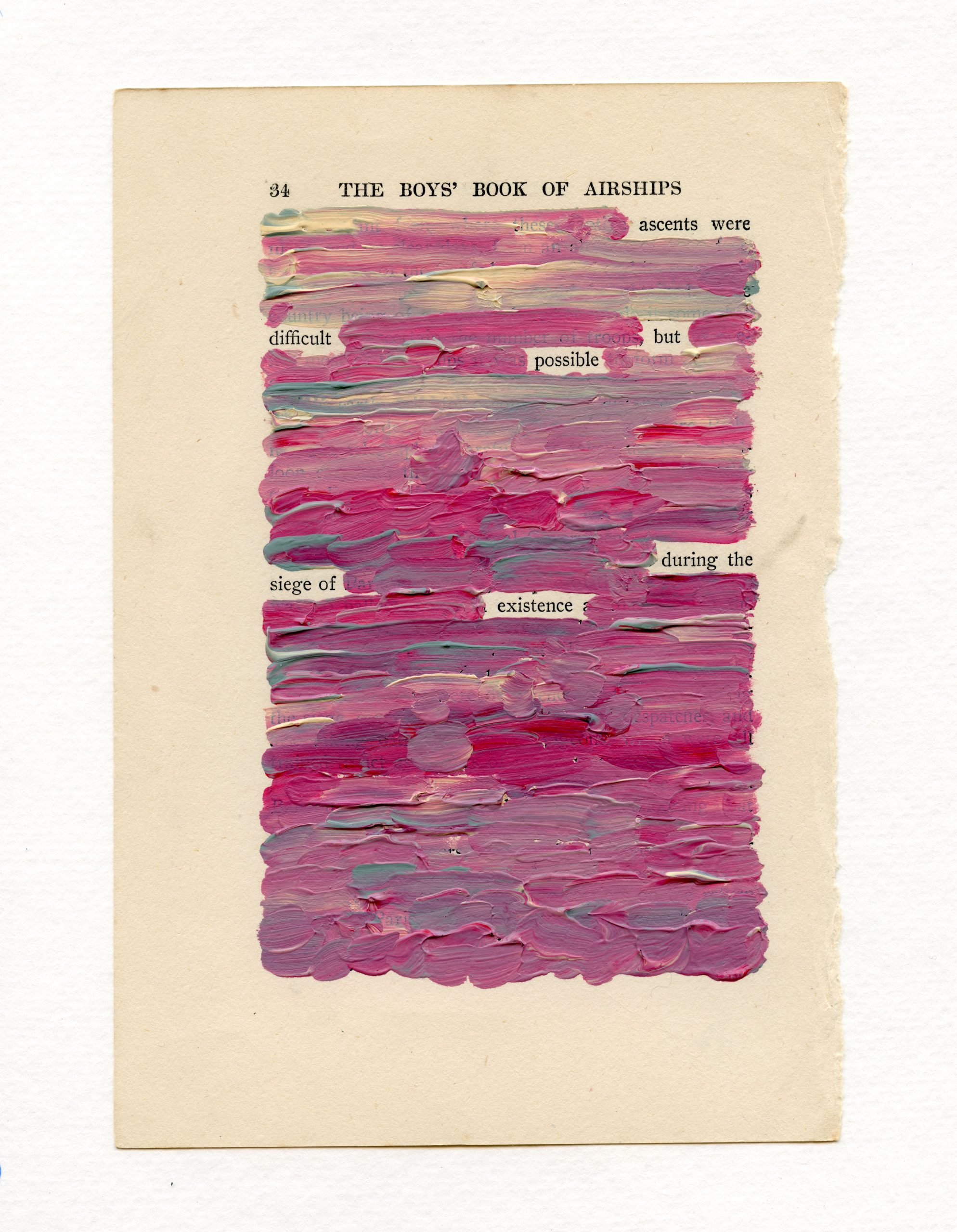
Source: The Boys’ Book of Airships and Other Aerial Craft;
Method: My nightly ritual
Lauren Paredes is a storyteller across mediums with a soft spot for the unusual.
I am born in this month
to someone else’s suns
clouds drifting, like mountains moving, without seeming
dug from the white sand ocean dream
waves and waves and waves.
What have I come for
Footprints dug deep into the beach, left there
and cracking into halves. Weightless bodies
printing my grandfather’s wilderness
stolen from bodies and bodies this
bobbing softly in the water,
rock me back to myself
The me is from shoulders down for air
echoing from the cavern behind
with a long tear at the top that I know I should have stitched,
I labor to bring forward a virgin breath
I come to the same place
my pulse beating strong and steady
I will be here longer
Born: as act against, into.
A cento with lines from these poems, which were published in places in which my own work has also been published (reflecting the poem’s theme). The final line is a self-citation, entering my own voice into the literary sphere.
H. C. Phillips currently writes and studies neuroscience. Past forays include studying physics and an upbringing in the south-eastern suburbs of Melbourne, Australia. For now, nestled in the mountains of Port Moody, Canada.
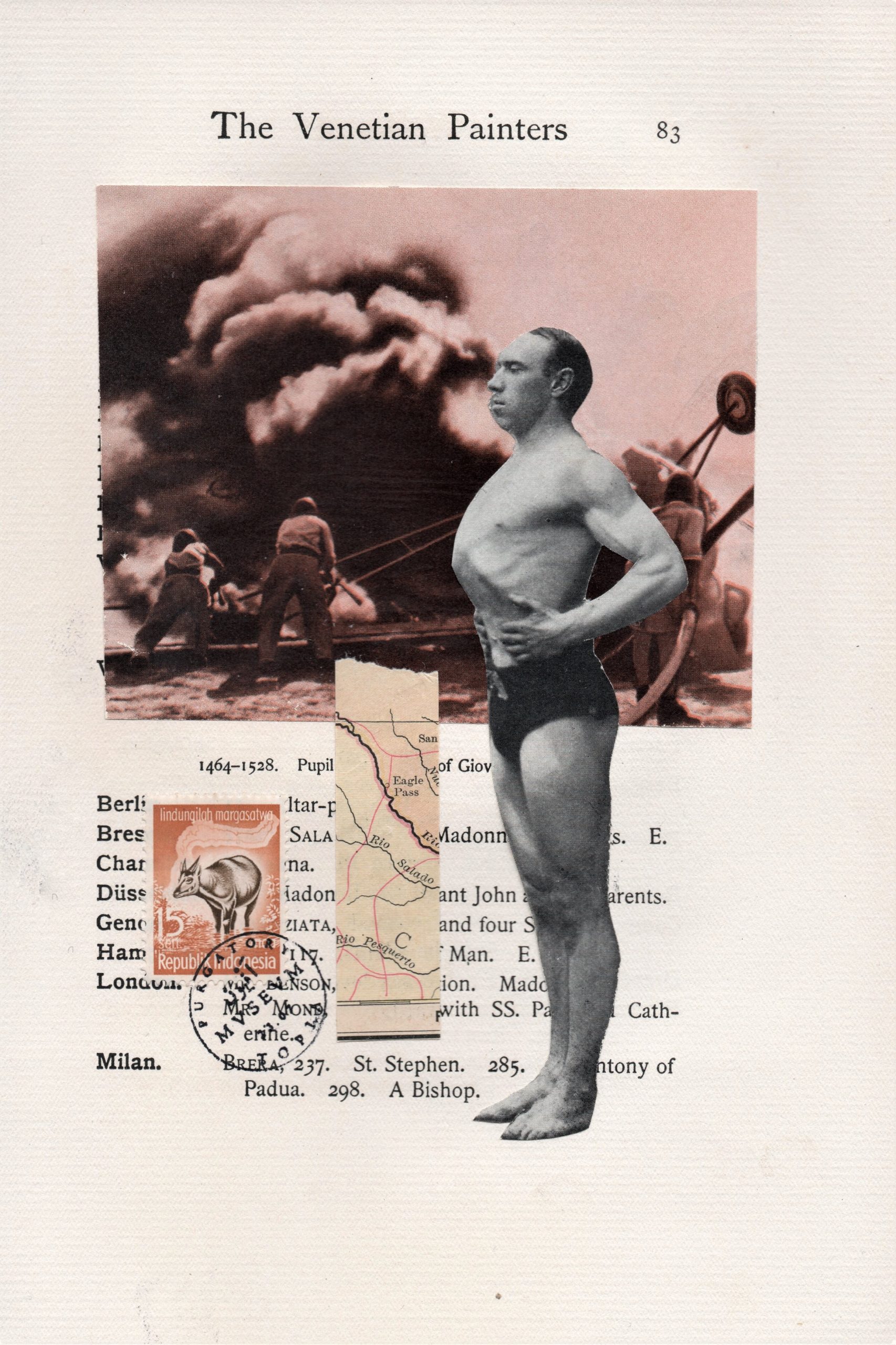
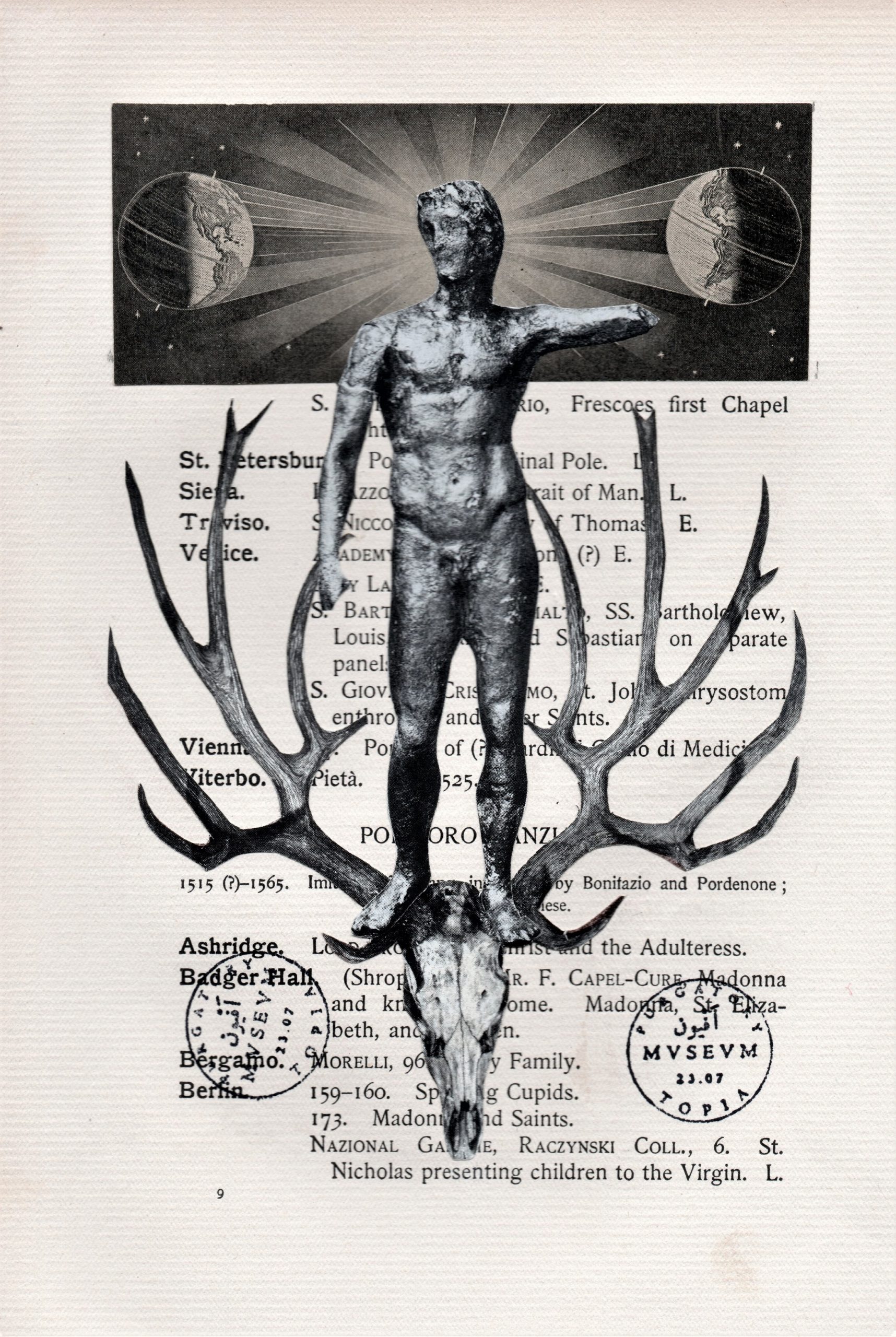
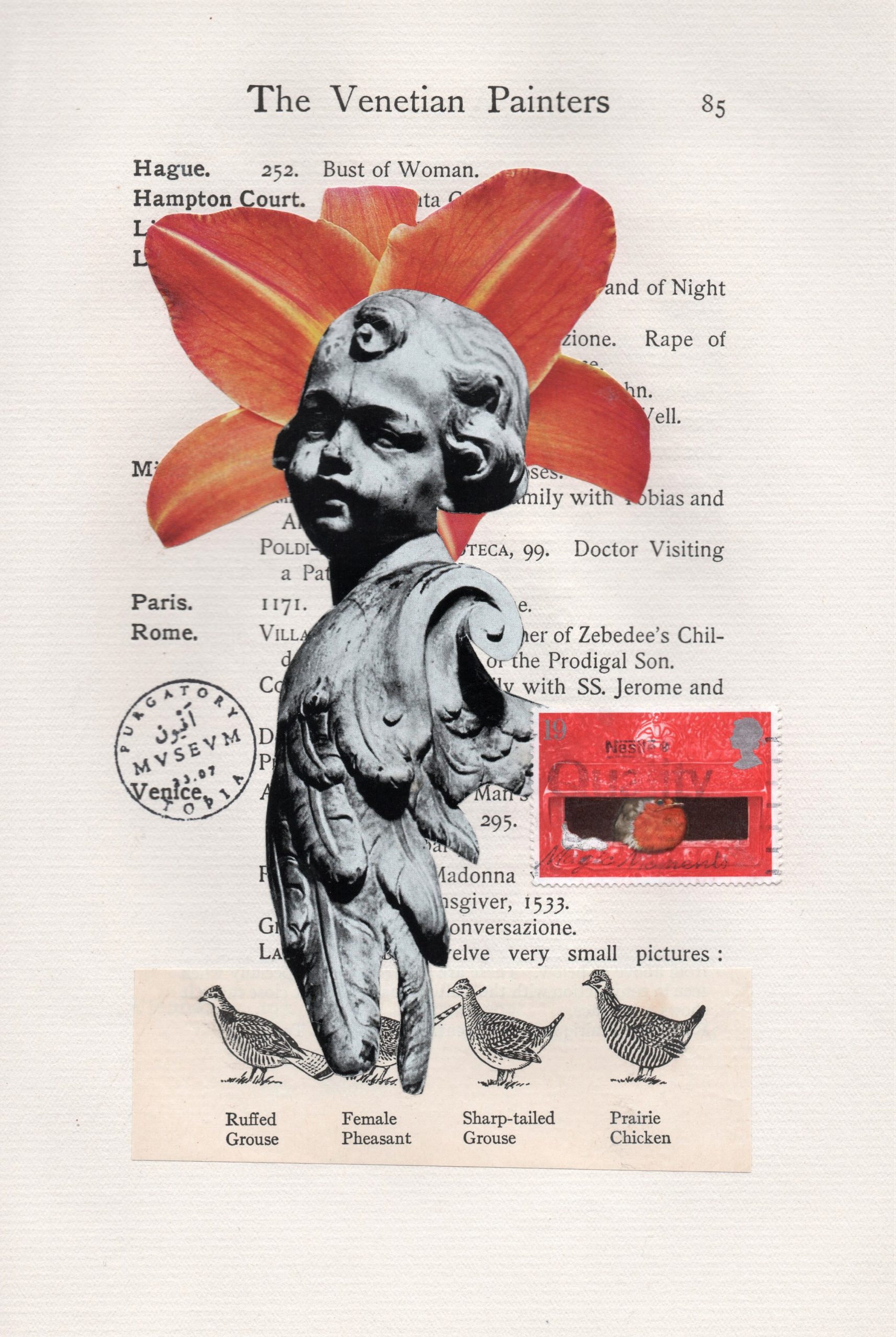
Hand-cut collages on pages from The Venetian Painters by Bernard Berenson. Rubber stamp designed by Nick Bantock.
Thomas Terceira lives in Cranston, Rhode Island. He earned a BS in Crafts Design from FSU 1n 1977 and a Certificate in Print Design from RISD in 2006. He works in collage, jewelry and plays world percussion instruments. His collages have appeared in Rattle, Glassworks, and other literary Journals. He has exhibited his art works both nationally and internationally.

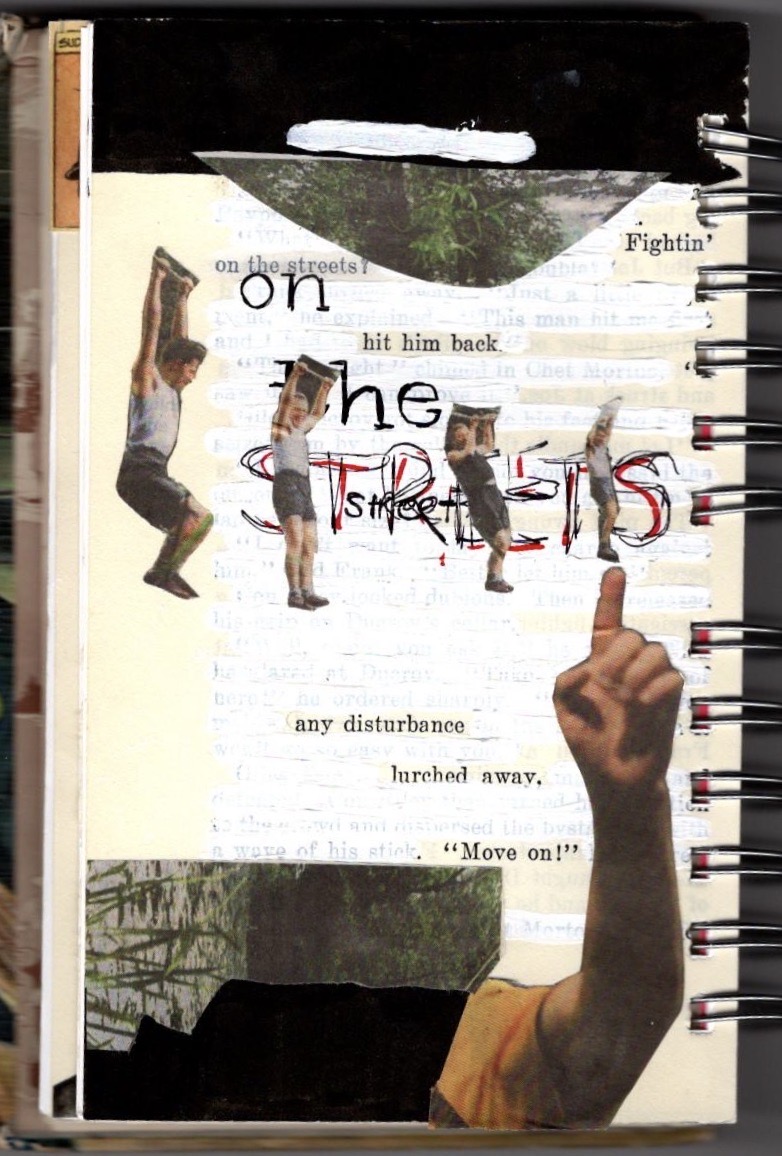
I erase using a combination of acrylic paint and collage; while I call it erasure, it’s really more like erosion as I whittle away at the text until all that’s left are the phrases that constitute the poem. I then go in and add images or illustration where appropriate.
Remi Seamon is a 6th Form student in Cambridge, England. She was commended in Foyle Young Poet’s of the Year and considers her greatest muse to be Max, her labradoodle.
At first, they say, the earth was surrounded by moisture.
—Aristotle, Meteorology
The snow had come suddenly a few hours ago. The silence meant someone was coming. The night skies were filled with warnings, although the human did not know what to do with the information (their reckoning of time is also incorrect). Curse them both!
He stared at the cat, struggling for words. That seemed to please the animal even further. Their gazes locked for a long moment, and instead of fire coming from their mouths, they uttered harsh words toward one another. From even the lowliest beast comes wisdom. They would soon have to part forever.
A third of the pure water turned deadly. The ocean itself was becoming tinged with an unnatural, bloody hue, clearly alarmed at the situation. A huge swell arose. Fire lit up the sky. The flames subsided, and glowed with only natural radiance once again.
He watched the water that housed darker things fall slowly down on him. The darkness parted to reveal the light. He splashed and pranced, yelping now and then with what was clearly frustration. Though I am named after the fiercest of beasts, I cannot cast him into the abyss. It began, again, to snow.
“The Hydrologic Cycle” is a a cento taken from a bargain-bin fantasy novel whose title and author I can’t remember, since lost and not online.
F.J. Bergmann edits poetry for Mobius: The Journal of Social Change and again, temporarily, is editing Star*Line. She imagines tragedies on or near exoplanets. Work appears irregularly in places that should have known better.
Franklin County rolls across green hills and bluegrass, nestling the secrets
of an American spirit, proven, spiced with heavy oak, and untouched by human hands.
Pappy was a charred man with a manner that oozed bourbon, not in odor but in a velvety directness that could burn the back of your throat and still leave you with the friendship of warm caramel.
Offering kindness and demanding respect, he spoke with a slow ease that lulled a man into a drowsy Kentucky afternoon or dropped him to his knees like a sermon at Buck Run Baptist Church.
His presence was best sipped, in a rocking chair by a fire or on an evening porch swing
where vanilla sugar hung in the air like morning mist over wheated fields.
This poem is drawn from the back label of a bottle of Pappy van Winkle bourbon (15 year).
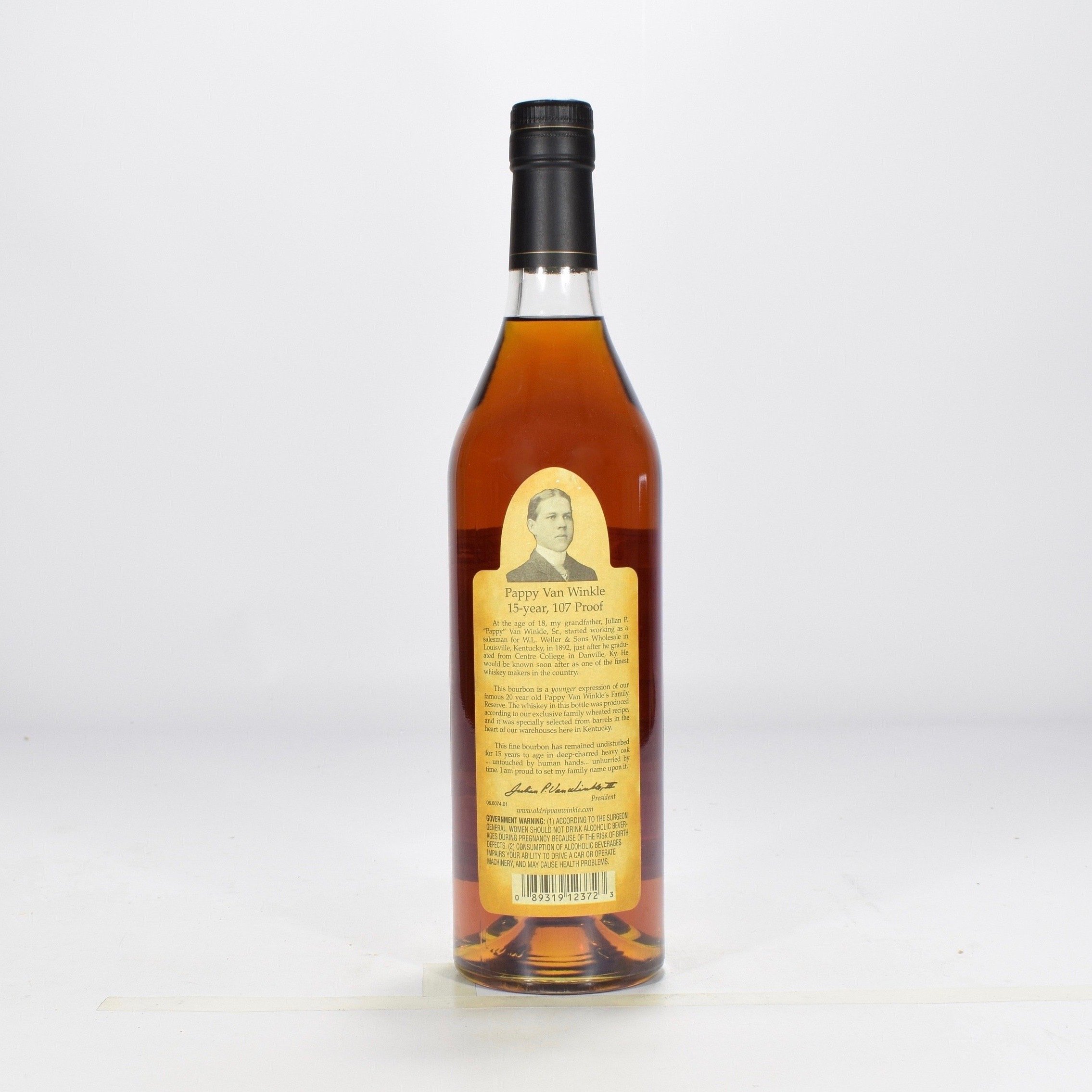
Scott Brown is a psychologist and a poet. He uses poetry with his patients and students, as means of self-discovery and expression. Scott lives and practices near Kansas City, Missouri. He has published previous work in The Avalon Literary Review, Down in the Dirt Publications, The Small Farmer’s Journal, and Inside the Box.